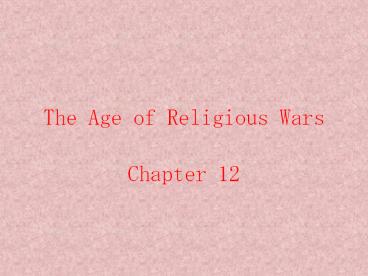The%20Age%20of%20Religious%20Wars - PowerPoint PPT Presentation
Title:
The%20Age%20of%20Religious%20Wars
Description:
Henry IV takes power, converts to Catholicism, and makes ... Mary Tudor restored Catholicism of Henry VIII. Elizabeth I: Mary's half-sister and successor ... – PowerPoint PPT presentation
Number of Views:93
Avg rating:3.0/5.0
Title: The%20Age%20of%20Religious%20Wars
1
The Age of Religious Wars
- Chapter 12
2
The French Wars of Religion (1562 1598)
- Huguenots French protestants under government
surveillance in 1520 - Henry II began persecuting Huguenots
- Persecutions ended under the reign of Henry IV in
1589
3
January Edict
- Issued in 1562
- Issued by Catherine de Medicis, regent for
Charles IX - Edict granted Protestants freedom to worship
publicly
4
Beginning of the French Religious Wars
- March 1562 Duke from Guise family led massacre
on Huguenots, which spawned the French War - Huguenots Protestants fought against the Guise
faction ltCatherine allied with the Guise family
herselfgt
5
St. Bartholomews Day Massacre
- Happened in 1572
- 3,000 Huguenots were killed on St. Barths Day
- Supported by Catherine of Medicis
- Within 3 days following, more than 20,000
Huguenots had been executed
6
The Peace of Beaulieu
- Led by Henry III in May 1576
- Granted Huguenots almost complete religious and
civil freedom - Within 7 months, Catholic League forced Henry to
retract these liberties - Henry III assassinated...
- Henry IV takes power, converts to Catholicism,
and makes settlement w/ Huguenots...
7
Edict of Nantes
- Issued on April 13, 1598 by Henry IV
- Recognized Huguenots rights within France
- Granted Huguenots freedom of worship, right of
assembly, and a series of other liberties
8
Imperial Spain and Reign of Philip II (r.
1556-1598)
- Philip II of Spain Powerful Catholic ruler of
Hapsburg lands - Battle of Lepanto Spain defeated Turkey
- Spain annexed Portugal and gained access to their
colonies in Africa, India, and the Americas
9
Philips Failures
- Tried to conquer the Netherlands
- Resisted by William of Orange and the Count of
Egmont - Egmont was executed
- Resistance put down by Duke of Alba
- Dutch continued their campaign against Spanish
governance
10
Other Stuff About Spain
- Pacification of Ghent Catholic and Protestant
provinces came together against Spain in 1576 - Twelve Years Truce True peace with Spain
achieved in 1609 - Peace of Westphalia Full recognition of peace
finalized in 1648
11
England and Spain (1553-1603)
- Mary Tudor restored Catholicism of Henry VIII
- Elizabeth I Marys half-sister and successor
- 1559 Act of Supremacy undid anti-Protestant
legislation Mary had enacted - The act made Elizabeth Supreme Governor
- Elizabeth strove to maintain middle ground
between the Catholics and Protestants
12
France allies with England
- Facing a real threat from Spain, England allied
with France in 1571 - Elizabeth decided to execute Mary Stuart, Queen
of Scots - Marys assassination, being an ardent Catholic
and heir to the Scottish throne, aroused Catholic
anger
13
Spain vs. England
- Philip II ordered his Armada to prepare for war
w/ England - Battle resulted in complete victory for England
- Encouraged European Protestants
14
The Thirty Years War (1618-1648)
- Complicated Series of battles in four phases
- Bohemian (1618 - 1625)
- Danish (1625 - 1629)
- Swedish (1630 - 1635)
- Swedish-French (1635 - 1648)
- Mainly because the countries had radically
different political and religious agendas
15
The Bohemian Period (1618 1625)
- Calvinists demanded more freedom from Catholic
Hapsburg ruler Ferdinand - Defenestration of Prague Protestant nobility
responded to Ferdinands revocation of religious
rights by throwing two of his regents out a window
16
Danish Period(1625 - 1629)
- King Christian IV of Denmark tried to bring
Protestantism to Germany - Forced to retreat by Maximilian
- Edict of Restitution 1629, Ferdinand outlawed
Calvinism
17
Swedish Period(1630 1635)
- Military tactics of King Gustavus Adolphus of
Sweden helped Protestants with the battle at
Breitenfeld - Swedes refused to join the Peace of Prague
Agreement - POP Agreement compromise between German
Protestant states and Ferdinand
18
Swedish-French Period(1635 1648)
- Final phase of Thirty Years War
- Involved French, Swedish, and Spanish soldiers
wreaking havoc in Germany - At this point in the war, religious issues became
secondary to political ones
19
The Treaty of Westphalia (1648)
- Stopped Ferdinands Edict of Restitution
- Recognized Calvinists
- Independence of Swiss Confederacy and provinces
of Holland proclaimed - German princes acknowledged as supreme rulers
- Broadened legal status of Protestantism
- Caused more of Germanys internal division and
political weakness

